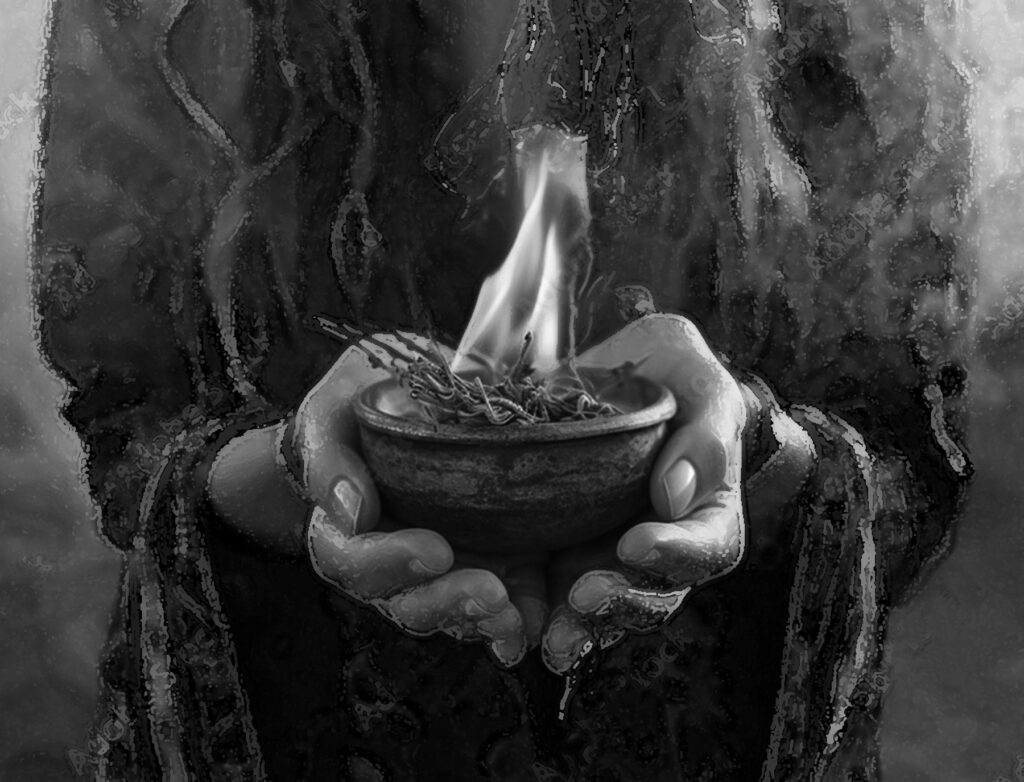Today is the last Friday of March, and it is stifling hot over here on the island, its jungle mountains overlooking the Pacific seaboard. A dry spell is forecast to last until October. The heat drones heavy and dull and hangs like a clotted mist over a clogged field. In their bamboo hut by a rocky bend of shore, two women are packing the orchids and the honey they have collected from the forests over the weekend. A motorboat from their province comes once a month to pick up items for dispatch at the capital. Alerted by the clamor of human voices and the patter of approaching feet, daughter Guea ponders: Who could they be? And what could have brought them over? She recognizes the arrivals when they stop in front of the yard and form a line.
“It’s the villagers whom we faced at the mayor’s office, Mama.” From the group she picks out the village chief—all airs, tossing his head stiff.
He bawls out: “Women, we are calling you to quit this place now, or we’ll be forced to evict you.”
Stung by this insolence, the women yet manage to control their rage. “What for?” The mother exclaims. “Hasn’t a decision been handed down yet? Isn’t the mayor going to dispatch a police unit? I don’t understand.”
Indeed. The mother and daughter were charged by the village elders for witchcraft and sorcery. Suffer not a witch to live, the Scripture says. Under summons the two women appeared at the mayor’s office on the mainland, thirty minutes by boat. The case was set under a conciliation process without assistance of counsel. Because the accusations dealt with sensitive issues, only the complainants and respondents were allowed inside. The case was heard orally.
Testimony was offered to show that one nightfall, two young girls, dumbstruck and shivering, were found in the shack of the mother-daughter, that on the stove the pot was boiling with uncommon ingredients which tended to show that the pair was steeping a brew to produce a potion, that on inspection the next day the village officials found skeletons of the human skull, torso, and other bodily parts stacked in a corner of the dwelling, that they practiced black magic as evidenced by spirit-wrapping, table-turning, waving of a wand; that upon their arrival on the island a dog howled intermitently, and a she-goat performed a demonic dance; further, that they have not mingled in village life.
The mother-daughter denied the charge. The young girls had wandered along the wooded hills trying to catch butterflies and were caught by a heavy downpour at dusk. The mother-daughter found them huddled under a tree. The mother boiled a mixture of herbal roots and leaves to bathe them and to serve them with hot broth. The elders were going to conduct the girls to the village officials, if nobody came.
The human skeleton found in their shack belonged to a young mermaid which they had dug under a land bank. It had probably been swept and washed ashore by a storm. While a human is biped, the lower half of the mermaid’s body is a fish’s tail. The bones had petrified.
Two weeks after the women had settled on the island, two demonic spirits arrived at the place to live in their former dwelling but found it occupied. They harked to displace the women who held on; the demons then set a dog and a she-goat to divert the mother and daughter from sleep and quiet. The woman doused the animals with flame which streaked off shrieking and dissolved in the air.

The women, while new in the place, had not been a charge to the public treasury, surviving on the bounties of the earth—fruit bread, honey, root crops, small game, and fish.
That a self-directed life enhances initiative and contributes to the common goals or interests. That social distancing enhances self-reliance and promotes intensive living, industry, and thrift, and that their fitness for social life is found wanting and left untried.
At the conclusion of the evidence, the mayor said that a law must define and provide the penalties therefor. Absent, these requisites are fatal. No offense has been committed, the charge is improperly laid. An allegation is not proof. He did not elaborate.
The villagers now press on towards the hut. One fellow of the baser sort hops and jumps landing on the threshold. He lays a hand on the woman’s arm and would have dragged her, but she jerks his hand away. Suddenly, a whack from a wooden stick hits him on the arm. Shocked, the rascal reels off. The blow came from the leader of the police team which had timely arrived from the town proper. “You are under arrest—caught in the act,” announces the leader, “You have the right to remain silent.” To his companions: “Tie him up and throw him to the sea!” Turning to the villagers, he orders: “Get out, all of you!”
“The mayor betrayed our trust,” replies the village chief. “He met with the women in private before the hearing.”
“We have our orders—” interrupts the leader.
“The secrecy of the meeting defeats the neutrality of an impartial judge and makes him partisan,” continues the village chief.
The rascal now raises his hands as if to fall upon the woman again.
Puffing, Guea yells: “That’s enough!” Turning to her mother: “Give it to them, Mama,” she implores.
“No,” voice though tired is not subdued or enfeebled.
“It’s all right, Mama.”
Guea flaps a silvery wand, then takes swipes from a flask and spews the liquid on the ground, sparking a flame. Thinking the liquid carried poisonous powers, the rascal retreats, squeaking and lisping like crazy.
Presently, light diffuses in the hush of lengthening shadows. A procession of torches approaches the hut and stops on the grassy grounds before the front yard. But the lights go off at once as if they were intended merely to scare, to subvert the zeal and muster. At worst, they betray an excess to pretence and ignorance. A din of shuffling feet subsides.
I reckon it’s a witching time of night, Guea thinks.
At first it is only a small flame, Guea observes, creeping along the side of the bamboo slat walling. Then the fire climbs towards the roof and within fifteen minutes, it has consumed the entire house.
The next morning, upon the mayor’s instruction, I set out to find the two women in the hinterlands of Panay to deliver a special message. At the town proper, I hired a horse and rode behind the guide. We found the women on the brow of a wooded mountain beside a spring with gardens growing orchids profusely. In the breeze, Guea: robust neck, broad hips, full-blooded, from her cleavaged breast arose a dizzying scent of a woman, an earthly loveliness, and in her walk it showed, she was indeed a heavenly beauty. After exchanged courtesies, I told her on the side: “The mayor is pining away and needs a healing.”
“Do tell him all’s well. I’m sending him untamed roses.” A pot was boiling nearby with—I reckon—a brew. What I saw gave me the creeps. In the cleft of the stump of a tree, a human skull was brooding. On the earth beneath were burnt-out candles. As I turned to leave, I saw the skeleton, grinning, wink at me: the flesh cleaved from the bones.



